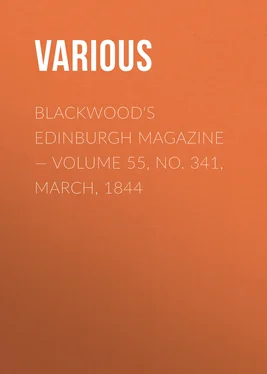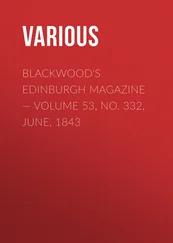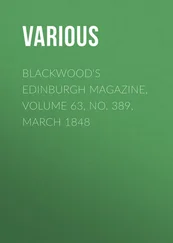Various - Blackwoods Edinburgh Magazine – Volume 55, No. 341, March, 1844
Здесь есть возможность читать онлайн «Various - Blackwoods Edinburgh Magazine – Volume 55, No. 341, March, 1844» — ознакомительный отрывок электронной книги совершенно бесплатно, а после прочтения отрывка купить полную версию. В некоторых случаях можно слушать аудио, скачать через торрент в формате fb2 и присутствует краткое содержание. Жанр: foreign_antique, periodic, foreign_edu, на английском языке. Описание произведения, (предисловие) а так же отзывы посетителей доступны на портале библиотеки ЛибКат.
- Название:Blackwoods Edinburgh Magazine – Volume 55, No. 341, March, 1844
- Автор:
- Жанр:
- Год:неизвестен
- ISBN:нет данных
- Рейтинг книги:5 / 5. Голосов: 1
-
Избранное:Добавить в избранное
- Отзывы:
-
Ваша оценка:
- 100
- 1
- 2
- 3
- 4
- 5
Blackwoods Edinburgh Magazine – Volume 55, No. 341, March, 1844: краткое содержание, описание и аннотация
Предлагаем к чтению аннотацию, описание, краткое содержание или предисловие (зависит от того, что написал сам автор книги «Blackwoods Edinburgh Magazine – Volume 55, No. 341, March, 1844»). Если вы не нашли необходимую информацию о книге — напишите в комментариях, мы постараемся отыскать её.
Blackwoods Edinburgh Magazine – Volume 55, No. 341, March, 1844 — читать онлайн ознакомительный отрывок
Ниже представлен текст книги, разбитый по страницам. Система сохранения места последней прочитанной страницы, позволяет с удобством читать онлайн бесплатно книгу «Blackwoods Edinburgh Magazine – Volume 55, No. 341, March, 1844», без необходимости каждый раз заново искать на чём Вы остановились. Поставьте закладку, и сможете в любой момент перейти на страницу, на которой закончили чтение.
Интервал:
Закладка:
The embassy were now fixed under the protection of the monarch; and they were invited to join in the various displays and festivals of the new year, which the Abyssinians begin on the 10th of September. Of these, the cavalry review was by far the most showy, as well as the most suited to the gratification of the British officers. Some parts of this display seemed to have been borrowed from the days of European knighthood. The king's master of the horse advanced at the head of his squadrons of picked household cavalry, "the flower of the Christian lances." Ayto Melkoo, their leader, was arrayed in a party-coloured vest, surmounted by a crimson Arab fleece, handsomely studded with silver jets. A gilt embossed gauntlet encircled his right arm, from the wrist to the elbow; his targe and horse trappings glittered with a profusion of silver crosses and devices, and he looked a stately and martial figure, curveting at the head of his well-appointed lancers.
This warrior, advancing with his line, galloped up in front, and made a speech in the manner of old heroic times, vaunting his past prowess and his present loyalty, his troopers accompanying the more succcessful parts of his speech by striking the lance upon the targe. At the close, he threw his spears upon the ground, unsheathed his two-edged falchion, gave a howl, which was answered by a roar from his horsemen, and a discharge of fire-arms; and the whole made a dash, and charged across the parade.
At the royal command, the British now fired a salute of twenty-one guns, to the great wonder and astonishment of the wild Galla and the multitude of spectators. Thirteen governors, (of provinces, we presume,) clothed in the skins of lions and leopards and covered with silver chains, cuirasses, and gauntlets, emblems of their gallantry in the field, next passed before the king, each at the head of his troop, and each making a harangue. Abyssinia must be a very oratorical country. Last of all, came the tall, martial figure of Abegoz Moreteh, chief of the tributary Galla of the south, at the head of his legion, three thousand in number: this "sea of wild horsemen" moved in advance, to the sound of kettle-drums, their arms and decorations flashing in the sun, and their ample white robes and long sable hair streaming in the breeze. At the war-hoop of their leader, "with the rush of a hurricane the moving forest of lances disappeared under a cloud of dust." From eight to ten thousand cavalry were in the field; and the spectacle, which lasted from nine in the morning until five in the afternoon, was "exceedingly wild and impressive." But the most impressive display of all was to be supplied by the British. With fire-arms the people were acquainted already. The "brass galloper," though viewed with "wonderful respect," was still only an engine on a larger scale than those to which they were familiarized. But the rocket was a formidable and splendid novelty. Night had now thrown her mantle round the field, and, by the king's command, the rocket practice began; the first brilliant rush into the air was matter of amazement to all. When the rocket started with a roar from its bed, men, women, and children fell on their faces—horses and mules broke from their tethers—and the warriors who had any heart remaining shouted aloud. The Galla tribes, who witnessed the explosion, ascribed the phenomenon to "potent medicines," and declared, that since the Gyptzis (British) could, at pleasure, produce comets in the sky and rain fire down heaven, there was nothing for them but submission to the king's command.
The review was followed, at some interval of time, by a more substantial display. Thrice in the year the king summons his rude militia for an inroad into some of the neighbouring lands; and, as he was particularly anxious to have the presence of the embassy on this occasion, and as they conceived it to offer the best opportunity of seeing the country, they accordingly accepted the invitation. As it is to be presumed that they had no intention of taking any personal part in this marauding expedition, we are not disposed to criticise their acquiescence; otherwise there could be no doubt whatever, that they had no right to assist the king of Shoa in his foray on his neighbours, more than they would have had a right to assist his neighbours in their attacks upon the king of Shoa.
The march was peculiar, and even pompous, in its kind. It was extraordinary to see it preceded by a copy of the Holy Scriptures, under a canopy of scarlet cloth, and borne on a mule; but, it must be owned, accompanied by the "Ark of the cathedral of St Michael," which works miracles, and is regarded as a pledge of victory. Then came the king on a specially caparisoned mule, surrounded by his guard of shield-bearers, and flanked by matchlock-men; then came forty damsels, royal cooks, painted with ochre, and muffled in crimson-striped robes of cotton—a troop rigorously guarded by attendants with long white wands. Beyond these, as far as the eye could penetrate the clouds of dust, every hill and valley teemed with horsemen, camp-followers, sumpter-mules, and men carrying sheaves of spears, and leading caparisoned horses, all mixed in the most picturesque confusion. After a march of fifteen miles, the female cooks halted, like a flight of flamingoes, in a pretty, secluded valley. It was evident that the day's march was now at an end, and the army halted to bivouac for the night. In the centre of this straggling camp, which could not be less than five miles in diameter, was raised a suite of royal tents, consisting of a gay party-coloured marquee of Turkish manufacture, surrounded by twelve ample awnings of black serge, over which floated five crimson pennons, surmounted respectively by silver globes. There was something of African, or perhaps European, pomp in this proceeding. Until the royal tents were enclosed from the vulgar eye, the Negoos, ascending an adjacent eminence with his chiefs and an escort of picked warriors, remained seated on cushioned alga , and under the crimson canopy of the state umbrella.
When night fell, rockets were fired by the royal command, "to instil terror into the breasts of the Galla hordes;" and the peak which ran near the headquarters, was chosen as the most central spot for the display. The effect, brilliant every where, was here all that even Majesty could have desired. The "fire-rainers" (the picturesqe name which, we presune, Major Harris has adopted from the natives) produced delight, wonder, and terror, in all their degrees; and if the Galla nation were present, they must, to a man, have solicited chains, rather than be roasted alive by those flying monsters, which the people seem to have taken for the works of magic, if not magicians themselves. The display was followed by a repast in the old heroic style, and which will not be forgotten, should Abyssinia ever give the world a sable Homer.
"The chiefs and nobles sat down to their feast in the royal pavilion, where hydromel, beer, and raw flesh were in regal profusion!! After supper, speeches were made in the Homeric style, boasting of what the warriors had done, and intended to do. A fragment of one of the speeches; addressed to the English as the party broke up, gives a fair idea of Abyssinian table eloquence, 'You are the adorners,' (the orator had been decorated with a scarlet cloak;) 'you have given me scarlet broadcloth, and behold I have reserved the gift for this day. This garment will bring me success; for the Pagan who sees a crimson cloak on the shoulders of the Amhara,' (Abyssinian,) 'believing him to be a warrior of distinguished valour, will take, like an ass, to his heels, and be speared without the smallest danger.'"
The march, and the foray into the country of one of the Galla tribes, are admirably told, and perhaps are among the best descriptions in the volumes—exact without being tedious, and deeply coloured without exaggeration. But we must hasten to other things. This was the monarch's eighty-fourth foray; and on this we may conceive something of the horrors of barbarian life, and of the tremendous evils which nations have escaped whose laws and principles tame down the original evil of man.
Читать дальшеИнтервал:
Закладка:
Похожие книги на «Blackwoods Edinburgh Magazine – Volume 55, No. 341, March, 1844»
Представляем Вашему вниманию похожие книги на «Blackwoods Edinburgh Magazine – Volume 55, No. 341, March, 1844» списком для выбора. Мы отобрали схожую по названию и смыслу литературу в надежде предоставить читателям больше вариантов отыскать новые, интересные, ещё непрочитанные произведения.
Обсуждение, отзывы о книге «Blackwoods Edinburgh Magazine – Volume 55, No. 341, March, 1844» и просто собственные мнения читателей. Оставьте ваши комментарии, напишите, что Вы думаете о произведении, его смысле или главных героях. Укажите что конкретно понравилось, а что нет, и почему Вы так считаете.












